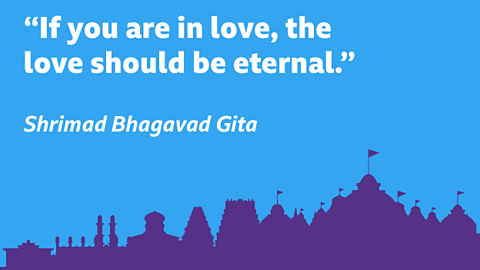Key points about relationships and family
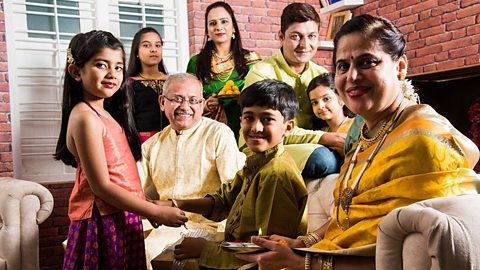
- Hinduism teaches that family is the foundation of society.
- Marriage is celebrated as a spiritual stage of life, achieved as a Hindu moves through ashramasLife stages described in scripture: 1. Student; 2. Householder; 3. Retirement; 4. Sacred pilgrim..
- Hinduism teaches that sexual relationships should only occur in marriage between a man and a woman.
- According to Hindu teachings, in marriage, a couple should procreate. However, there are a range of views on the use of contraception.
- Gender equality is seen as very important in Hinduism, with every person having equal status and independent worth.
- Since the Vedic Age (c.вҖү1500 вҖ“ c.вҖү500 BCE)The time period in India where the Hindu religious texts called the Vedas were composed., a third gender has been recognised by Hindus.


МэМэ
МэМэ
МэМэ
Remember
There are different groups of Hindus, whose beliefs and practises are shaped by which gods they prefer to worship.
Examples of these groups includes Shaivism and Vaishnavism.
Video
Watch the video below to compare Hindu, Muslim and Christian attitudes and teachings towards marriage.
Christian
I'm a Christian.
Hindu
I'm a Hindu.
Muslim
And I'm a Muslim.
Christian
And we all believe that marriage is important.
Hindu
And it should be for life.
Muslim
Which is fine if everything goes well.
Christian
But what if it doesn't?
Hindu
Divorce is legal in the UK,
Muslim
but do our religions ever allow it?
Christian
Christianity teaches that men and women should get married and have children.
Hindu
And it's the same in Hinduism.
Muslim
Same in Islam.
Christian
In the Roman Catholic Church, marriage is one of seven sacraments, which are holy ceremonies, so marriage isn't taken lightly. In all Christian denominations, the wedding takes place in a church, and the bride and groom make solemn promises called vows to each other and before God, to be faithful to one another and to stay together till death do us part.
Hindu
It's a HinduвҖҷs 'dharma' - our duty - to pass through four stages of life called 'ashramas'. The second ashrama is the householder stage, and it begins when someone gets married. A priest called a 'Pandit' performs the wedding ceremony, and the bride and groom make their vows in front of the sacred fire, which represents Brahman, the one unseen spirit. And, according to the Rig Veda, one of our holy books, marriage is for life.
Muslim
Many Muslims get married because that's what the Prophet Muhammad (sala Allahu alayhi wasalam), did and we want to follow his example. He called getting married вҖҳhalf the faithвҖҷ because it's that important. A Muslim wedding can take place anywhere. All you need is a marriage contract, called the вҖҳNikahвҖҷ in Arabic, and two people to witness it being signed.
Christian
Because marriage is so important, divorce has traditionally been seen as something that Christians just shouldn't do. Although Jesus did allow divorce if one or both of the partners has been unfaithful. But even if a couple are given a legal divorce, the Roman Catholic Church doesn't accept it because it believes that the couple are still married in the eyes of God. Sometimes the Church might agree that there are grounds for separation or annulment. The Church of England and other Protestant denominations, such as the Methodist Church and the United Reformed Church, do allow divorce. But some churches don't allow remarriage. It's often left up to the priest or pastor to make the decision.
Hindu
Our religion doesn't allow divorce, but that doesn't mean that Hindu marriages don't break up. In India, the Hindu Marriage Act 1955 made divorce legal. So many Hindus worldwide have taken this to mean that divorce is sometimes acceptable. But it can be hard for Hindus to remarry. Most Pandits won't perform a second marriage ceremony because Hinduism teaches that a husband and wife become one being when they get married the first time.
Muslim
It's a bit different in Islam because the marriage is mainly seen as a contract between two people, not between the couple and Allah, divorce is allowed, but only as a last resort. The Prophet Muhammad (sala Allahu alayhi wasalam), called it вҖҳthe most detestable act that God has permittedвҖҷ.
Christian
I believe that people should get married if they're going to have children, so it's a big commitment. It's a spiritual and legal bond which should last a lifetime. But even though as a Catholic, I'm taught that divorce is never okay, I personally think that in cases where someone's being unfaithful or if there's abuse happening, then divorce should be an option because I believe that God is loving and forgiving.
Muslim
Every case is different. And Muslims believe that Allah is Al- Ghaffar, the Great Forgiver, and understands that sometimes we humans get things wrong and need another chance.
Hindu
We all believe that marriage is a gift from God.
Christian
And that gift shouldn't be wasted.
Muslim
So divorce should always be a last resort. But what do you think?
Nature and purpose of the Hindu Family
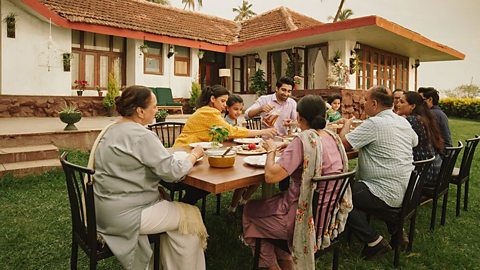
Nature of the Hindu family
Hindus believe that life is cyclical, this is called samsaraThe cycle of birth, death and rebirth.. This teaching has a strong influence on how Hindus view family and society.
In Hinduism, families can include nuclear familyA family unit consisting of two adults and any number of children living together. The children might be biological, step or adopted., stepfamilies, extended familyAny household which includes family members other than just parents and their children, such as cousins, grandparents or other relatives. and same-sex parents.
Many Hindus live in extended and joint families, which usually includes three or four generations living together, in one household. The adults take care of the children and in return, as the children grow up, they take care of their elderly relatives.

Ashramas
Hinduism recognises four stages of life called ashramas.
These stages are:
- Brahmacharya: The student
- Grihastha: The householder
- Vanaprastha: The retirement stage
- Sannyasa: The sacred pilgrim
The belief in ashramasLife stages described in scripture: 1. Student; 2. Householder; 3. Retirement; 4. Sacred pilgrim., means that all Hindus should go through the householder stageThe stage in a Hindu's life when the focus is on getting married and raising a family. of life, which includes a person having their own family.
A householderвҖҷs dharmaDuty in life. is to provide for their family physically, emotionally, spiritually and materially.
МэМэ
МэМэ
Purpose of the Hindu family
For Hindus, the purpose of family may include:
To provide support for the family and the wider community вҖ“ вҖңIf the family duty is performed and gifts given to the needy then there is heaven and nowhere else,вҖқ (The Laws of ManuA book of ancient Hindu laws about behaviour and religious duty.). Religious teachings remind Hindus of their roles and responsibilities, such as care of the elderly and children obeying their parents. These are considered part of living a moral life and fulfilling these duties is known as dharma.
To procreate вҖ“ Hindus believe that the happiness of a parent is based on having a continuous line of children: вҖңThrough a son he conquers the worlds, through a son's son he obtains immortality, but through his son's grandson he gains the world of the sun,вҖқ (Manusmriti 9:137).
To raise children in the Hindu faith вҖ“ The family is seen as important for the Hindu religion to continue and grow. A parent's role is to teach their children the spiritual way of life. For example, by the family worshipping together and completing the Sacred Thread ceremonyThe Sacred Thread is a ceremony for children to confirm they are of an age to take on religious responsibility., largely popular with Brahmin (upper caste) families, children come to understand what it means to be a Hindu.
GCSE exam-style question
Which of the following is the name given to a group of people who are related by blood, marriage or adoption?
a) bigamy
b) polygamy
c) family
d) children
c) Family is the name given to a group of people who are related by blood, marriage or adoption.

МэМэ
МэМэ
Exam top tip
МэМэ
For your exam, it is important to know the definitions of key terms.
Take our quiz below to test your knowledge.
Relationships and families key terms quiz
Marriage in Hinduism
The nature and purpose of Hindu marriage
The Hindu marriage ceremony is considered sacredHoly, related to God. Connected to a religious purpose., binding a couple together for life.
I promise to never abandon her, whatever happens.вҖқ
Hindu wedding vow
Marriage is one of the spiritual stages in life and takes the Hindu couple into the second ashramasLife stages described in scripture: 1. Student; 2. Householder; 3. Retirement; 4. Sacred pilgrim., from the student stage of life to that of the householder stageThe stage in a Hindu's life when the focus is on getting married and raising a family..
A Hindu wedding ceremony
Hinduism emphasises the importance of marriage being a lifetime commitment. This is reflected in many traditional Hindu stories such as Rama and SitaThe story of Rama and Sita tells the victory of good over evil. People light lamps and set off fireworks on Diwali, in memory of RamaвҖҷs heroic rescue of his kidnapped wife and queen, Sita..
If you are in love, the love should be eternal.вҖқ
Shrimad Bhagavad Gita
Traditionally, couples belonged to the same varnaThe social group (or caste) a Hindu was born into. and marriages were arranged. However, it is now much more acceptable for couples to find their own partner.
Hinduism teaches that the purpose of marriage is procreate/procreationTo produce/the production of offspring by means of sexual reproduction. and the joining of two families.
Women were created to bear children, and men to carry on the line. That is why there is a joint duty for husband and wifeвҖқ.
Laws of Manu 5
Polygamy
Polygamy is the act of marrying multiple partners, and is illegal in the UK.
Most Hindus believe in monogamyThe practice of being married to or having a sexual relationship with only one person at a time.. In India, the Hindu Marriage Act of 1955 made it illegal for a man to have more than one wife. Therefore many Hindus living worldwide take this to mean polygamy is unacceptable.
МэМэ
GCSE exam-style question
Explain two Hindu beliefs about the nature of marriage.
Refer to sacred writings or another source of religious belief and teaching in your answer.
Answers could include:
Most Hindus see marriage as a lifelong spiritual and physical union of a couple, as well as the uniting of two families. вҖңIf you are in love, the love should be eternal,вҖқ (Shrimad Bhagavad Gita).
Many Hindus believe that marriage helps them to progress in life, as they move from the first ashrama - the student stage, to the second ashrama - the householder stage. вҖңThe marriage ceremony, is meant to regulate the human mind so that it can be more peaceful for spiritual advancement,вҖқ (Bhagavad Gita 18.5).
Divorce and remarriage
Although divorce is permitted in Hindu Law, it is something that is discouraged and can carry a stigmaA mark of disgrace leading to social discrimination and disapproval., especially for women. In addition, Hindu law does not allow divorce if you belong to the BrahminThe highest caste or varna in Hinduism. Hindu priests are drawn from this caste, which is responsible for teaching sacred knowledge. caste.
O Husband and Wife! Remain here only вҖ“ do not separate.вҖқ
Rigveda 10 85:42
Although there is nothing stated about divorce in the Bhagavad GitaA 700 verse Scripture which is part of the Mahabharata, one of the Sanskrit epic poems from Ancient India., Hinduism teaches that marriage is for life. Therefore, separating or divorcing can be seen as breaking the laws of dharmaDuty in life. which could impact a Hindu's future lives.
That neither by any amount of money or by legal or social repudiation can a woman be released from her vow of being the wife of her husband.вҖқ
Manu Samhita 9:46
While Hinduism does not support divorce, if a couple have mutually agreed that the marriage should be dissolved, section 15 of the Hindu Marriage Act allows divorce.
Due to the importance that Hinduism places on family, if a divorce is granted, Hindus are expected to remarry. This is also the case if a person is widowed.МэМэ
GCSE exam-style question
Explain two contrasting Hindu beliefs about divorce and remarriage.
Refer to sacred writings or another source of religious belief and teaching in your answer.
Answers could include:
Religious teachings such as: вҖңO Husband and Wife! Remain here only вҖ“ do not separate,вҖқ (Rigveda 10 85:42), mean that many Hindus believe divorce to be unacceptable. They believe marriage is a divine contract and a lifelong commitment which cannot be broken.
However, there is nothing stated about divorce in the the Bhagavad Gita and therefore, in certain circumstances of marital breakdown, some Hindus believe that divorce is acceptable. Section 15 of the Hindu Marriage Act allows a divorce if a couple have mutually agreed that the marriage should be dissolved.
In pictures: Marriage, families, ceremonies and divorce in Hinduism
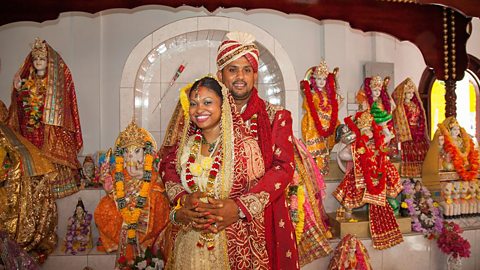
Image caption, A Hindu marriage ceremony is considered sacred and a marriage is expected to be a lifelong commitment. Traditionally the marriage will bring a new relationship between the families of the couple.
Image caption, Hindus are expected to be part of extended families. Traditionally this would include three or four generations of family living together in a family home.
Image caption, One of the duties in the householder stage of Hindu life is to pass on religious traditions to children. Young children participate in the Sacred Thread ceremony, Upanayana. This is the Hindu ritual of initiation, which marks the childвҖҷs entrance into the life of a student and their acceptance as a full member of the religious community.
Image caption, Some Hindus believe that divorce is unacceptable, as they believe marriage is a divine contract and a lifelong commitment which cannot be broken. According to religious teachings вҖңO Husband and Wife! Remain here only вҖ“ do not separate,вҖқ (Rigveda 10 85:42). However, there is nothing stated about divorce in the Bhagavad Gita.
Image caption, There are 16 ceremonies, called samskaras, associated with different stages of life, particularly during childhood.
1 of 5
What does Hinduism teach on same-sex marriage?
Same-sex weddings have been legal in the UK since new legislationA particular law, or a group of related laws passed by Parliament. came into force, in 2013.
For many Hindus, a key purpose of marriage is procreation and the The Laws of ManuA book of ancient Hindu laws about behaviour and religious duty. only teach about heterosexualHeterosexual is the word to describe people who are sexually attracted to people of the opposite gender. relationships. Some Hindus use this as an argument against homosexualityBeing attracted to people of one's own sex or gender. relationships and same-sex marriage.
However, some Hindus, such as those in the Smartism tradition, believe that sexual orientation is natural, as it has been given by God. Therefore every individual, regardless of their sexual orientation, should be respected as GodвҖҷs creation.
Men who are not aroused by women are said to be born as such due to previous life impressions.вҖқ
Charaka Samhita 4 2:17-21
This means that some Hindus believe same-sex couples should have equal rights. So whilst some Hindu priests choose to not perform Vivah sanskarHindu wedding ceremony. for homosexual couples, some will respect the choice of the couple and will perform Vivah sanskar for same-sex marriages.
Some Hindus accept same-sex relationships because of the sculptures and carvings of homosexual acts in ancient Hindu temples. Furthermore, Hindu religious texts and teachings do not specifically refer to, nor forbid, homosexual relationships.МэМэ
GCSE exam-style question
Explain two Hindu views about same-sex marriage.
Refer to sacred writings or another source of religious belief and teaching in your answer.
Answers could include:
Hindu teachings refer to marriage as a union between a man and a woman, where procreation can take place. The householder stage in Hinduism includes having a family. In addition the Manu-smб№ӣti 11:174 states: вҖңIf a man has sex with another man, then he should take shower with clothes on.вҖқ Some Hindus use this as evidence that homosexual relationships are not acceptable in Hinduism.
However, some Hindus believe that sexual orientation is natural, as it has been given by God: вҖңMen who are not aroused by women are said to be born as such due to previous life impressions,вҖқ (Charaka Samhita 4 2:17-21). Therefore, they believe that Hindus should respect all of GodвҖҷs creation and homosexuality should be accepted.
Hijra вҖ“ The third gender
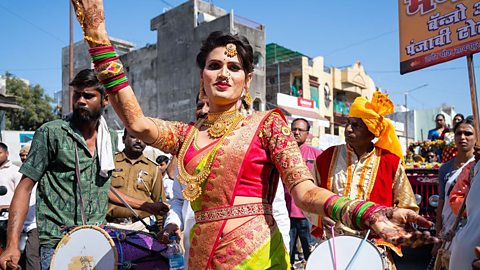
Hinduism recognises a third gender, Hijra.
The Laws of Manu suggest that this third gender is neither male nor female.
Many Hijras have traditionally left home to serve in communities, working in Hindu temples, serving the mother goddess Parvati.
The main characters in theatrical plays of the Mahabharata and Ramayana stories in India are mostly third gender.
Sex before marriage
For many Hindus, such as those of the ShaivismFor Shaivites, the goal is pleasing Shiva through simple acts of worship and renunciation. and VaishnavismFor Vaishnavites, Vishnu is supreme and his different forms are elaborately worshipped. traditions, having sex before marriage is seen as bringing dishonour into the family and is strongly discouraged. Sex is seen by Hindus as a gift from God and therefore should only take place within marriage.
Some Hindu teachings state that, while consensual, premarital sex is not an offence, should the couple then marry:
When he has a connection with a willing maiden, it is not offence вҖҰ but he shall honour her and espouse (marry) her.вҖқ
NДҒradasmб№ӣti 12,72
Within Hinduism, the intention of the action should be looked at to decide whether the sexual behaviour is lawful (dharma) or unlawful (adharma). If a person pursues sex purely for their own pleasure, it is considered unlawful.
Adultery
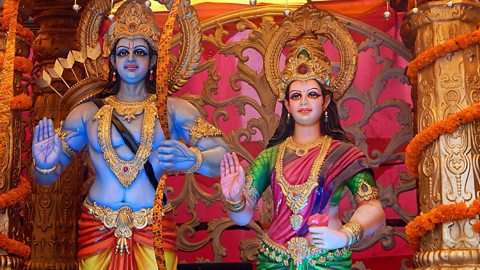
Sexual expression in marriage is important within Hinduism. The example of Rama and SitaThe story of Rama and Sita tells the victory of good over evil. People light lamps and set off fireworks on Diwali, in memory of RamaвҖҷs heroic rescue of his kidnapped wife and queen, Sita. as an ideal Hindu married couple, who were faithful to one another, is seen as the standard to be aimed for.
Committing adulterySexual intercourse between a married person and a person who is not their spouse. is betraying dharmaDuty in life., which could also prevent the attainment of mokshaRelease from the cycle of birth, life, death and rebirth.. Betrayal can bring bad kamma / karmaThe intentions behind actions and what the consequences of actions are. The idea that all actions (no matter how big or small) have consequences that can cause happiness or suffering. as well as harming family life, including preventing children from becoming good Hindus, which is not acceptable.
O married men and women; be loving and faithful to one another.вҖқ
Shikshapatri of Lord Swaminarayan

Contraception
For many Hindus, the purpose of marriage and sex is to have children. Family planning is seen as important and acceptable once a couple believes their family is complete. Hinduism teaches that contraception should never be used to avoid having children completely, as it is a HinduвҖҷs dharma to have children.
A man should have sex with his wife during her fertile season and always find satisfaction in his own wife.вҖқ
Laws of Manu 3
Ethical considerations on how the different types of contraceptionA method used to prevent pregnancy e.g. using a condom or a contraceptive pill. work are taken into account by many Hindus. Some contraception is seen as stopping life, which goes against some Hindu teachings that life begins at conception:
Where a man deposits the semen in a woman вҖҰ it becomes one with the womanвҖҷs body as if it were part of her own body.вҖқ
Aitareya Upanishad 2:2
The roles of men and women
Hindus believe that every soul is an actual or potential part of BrahmanBrahman is the ultimate reality, the divine consciousness, one supreme spirit. Brahman is male, female and even animal., so every soul must be of equal value, whatever the personвҖҷs gender.
I look upon creatures equally.вҖқ
Bhagavad Gita 9.29
However, some traditional Hindus believe that men and women have different purposes in society. Therefore men and women cannot have equal roles and responsibilities in religion. According to the teachings in the Shruti scriptures, women cannot be priests or religious leaders.
A girl, a young woman or even an old woman should not do anything independently, even in her own house.вҖқ
Law of Manu 5
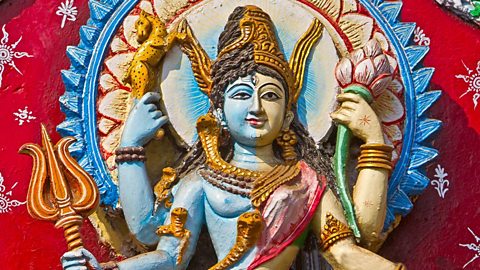
Traditionally, only males in the top three varnas, or castes, could study scriptures to the highest level. It was believed that women had essential duties in maintaining Hindu traditions within the home.
Other Hindus believe women should have equal rights in both life and religion. They think women should be allowed to be religious leaders because all souls are part of the divine, and are equal. They would point to references to women teachers in the UpanishadsHindu scriptures that develop the teachings of the Vedas..
This equal status is mirrored in the relationships between male and female deities such as ShivaOne of the most powerful Gods in Hinduism. Know as 'Shiva the destroyer', Shiva assists in creation by causing other things to end. With his consort Parvati (Shakti, Durga and Kali), known for their strength and power together. and KaliAn important Hindu goddess of death and destruction, often depicted as the female form or consort of Shiva..
GCSE exam-style question
Explain two Hindu beliefs about gender equality.
Refer to sacred writings or another source of religious belief and teaching in your answer.
Answers could include:
Some Hindus believe that every soul is an actual or potential part of Brahma so every soul must be of equal value, вҖңI look upon creatures equally,вҖқ (Bhagavad Gita 9.29). Therefore, everyone should be treated equally, whatever the personвҖҷs gender. Many of the deities in Hinduism are depicted as being of different genders and many Hindus believe that this acceptance of gender equality should be reflected in society.
However, some Hindus believe that men and women have different roles and so cannot have equal rights in religion and, because of the teachings in the Shruti scriptures, women cannot be priests or religious leaders, вҖңEquality of sexes does not mean equality of occupations,вҖқ (Mahatma Gandhi).
Hinduism scripture quiz
Relationships and families Hinduism quotes
1 of 5
